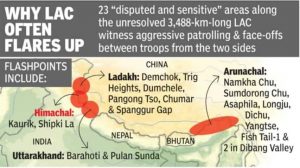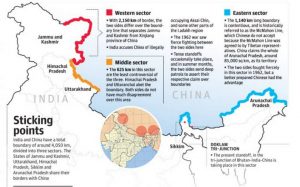21 Jun The comrades and their divergent perspectives (The Hindu, GS-2, International relations)
Context:- Russian President Vladimir Putin has recently asserted that both India and China are “responsible” enough to solve issues between their countries. They debar any “extra-regional power” to interfere in the process.
Why Russia is important to India:-
- The historical character of the bilateral relationship i.e. India was close to USSR during cold war era and USSR too helped India in it’s economic development.
- Defense partnership:- Russia still dominates the Indian defense inventory to the tune of about 70 per cent even after diversifying defense trade partners.
- Issue of Critical technology:- Russia remains the only partner that is willing to give India critical technologies, such as a nuclear submarine and other space capabilities.
- Critical security issues:-The emerging Russia-China strategic relationship has important security consequences for India.
- UNSC(UN Security Council):- Russia also reaffirmed its “unwavering support” to India for a permanent seat in an expanded UN Security Council.
- Nuclear Suppliers Group (NSG):- Russia expressed its support for India’s membership of the Nuclear Suppliers Group.
- Both countries have mutual benefits in supporting struggle against terrorism, Afghanistan, issues in Syria, climate change; organizations like SCO, BRICS, G-20 and ASEAN.
India and China Relations:- (History so Far)
-
Ancient and modern:-
-
-
- The Silk Road not only served as a major trade route between India and China.
- China was involved in a growing opium trade with the East India Company.
- According to the Shimla conference 1914, India and China had the Mac Mohan line which separated them.
-
-
1950:-
-
- Formal establishment of India and China diplomatic relations
- India was the first non-socialist country to establish relations with China.
- The phrase Hindi Chini Bhai Bhai became famous.
- Bandung Conference :- Both countries attended and jointly advocated the Bandung Spirit of solidarity, friendship and cooperation.
- It has led to the decolonization of the whole of Asia and Africa.
- Formation of a Non-Aligned Movement.
- The First NAM Summit Conference took place in Belgrade, Yugoslavia, in September 1961.
-
1962:-
- The border conflict led to a back seat in bilateral relations.
-
1976:-
- China and India restored ambassadorial relations and bilateral ties improved gradually with main focus on trust building.
- Since then Relations have improved and touched new heights in 2014 but the Doklam issue and other territorial issues led to setbacks in relation.
What are the Issues between India and China:-
- Territorial dispute between Eastern sector and western sector.
- China doesn’t accept the MacMohan line as the boundary demarcation between India and China because the Shimla Agreement was negotiated by Tibet and Tibet was not a sovereign state. So Tibet has no power to negotiate any agreement.
- Issue of access to market:- India pharma and agriculture companies don’t have proper access to Chinese market.
- Issue of Terrorism:- China doesn’t support the Indian definition of terrorism of cross border rather china propagates its own.
- Issue of Masood Azhar:– India wanted Masood Azhar to be declared as a UN designated terrorist but China always has her veto.
- NSG membership:- China always blocks India’s road to get NSG membership.
- UNSC Membership:- China, because of its veto power, always creates non-crossable hurdles.
- India has a huge trade deficit in the favor of China which makes India more dependent on china.


What is the tripartite issue between India, china and Russia:-
-
- Because of recent border issues, India and China relations touched a new low.
- India went closer to the USA in order to tackle Chinese hegemony on the border.
- This closeness of India with the USA antagonizes China more.
- USA led QUAD group, India is also a part of it, seen by Russia and china as the threat.
- QUAD groups new dimensions worry China on the pretext that it is mainly to contain china.
-
Russian Angle:-
-
-
- Russian economy is an oil and gas dependent economy. A depression in the oil prices contracted the Russian economy.
- Russia got sanctions from the USA in 2014 because Russia annexed part of Ukraine.
- Russian economy became more dependent on China.
- So Russia did not speak a word about the issue of Ladakh rather asked to maintain the status quo which is nothing but in the favor of china.
- Russia is having issues with the USA that’s why Russian and Chinese interest coincides.
- India doesn’t give priority to Russian interests according to Russia.
- Russia became an early proponent of the ‘strategic triangle’ to bring together the three major powers.
-
What India is doing in this scenario and the way forward:-
-
- In a virtual discussion with Australian and French counterparts recently Indian foreign minister asserted that no country can have a veto on India’s participation in the Quad.
- India’s attempt to reimagine a new geostrategic maritime role for itself.
- The incorporation of the Indo-Pacific concept in Indian diplomacy means that India can no longer be confined between the Malacca Strait and Gulf of Aden and just a counter weight rather.
- Russia’s ability to influence the India China relationship has become doubtful.
- India has deepened its ties with Japan and Australia in a way that is close to soft balancing.
- Quad is being formalized into a functional strategic alignment.
- India is particularly interested in a normalization of relations between Washington and Moscow as it will help it steer ties among the great powers.
Download Daily Current Affairs of 21st june 2021
Plutus IAS Current Affair Team Member



No Comments